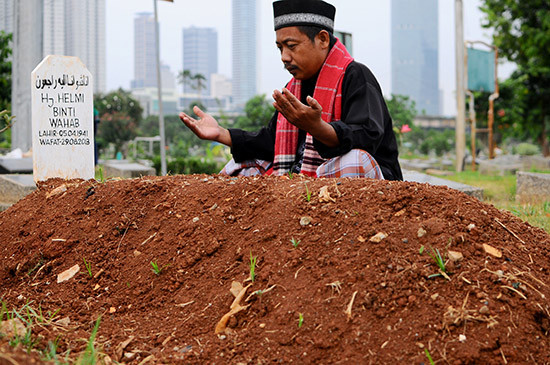Current Section: model

Lesson Condolences and Mourning Over the Deceased
Condolences
It is recommended to console the family of the deceased and try to make the relatives happy and strengthen them from what befell them with kind words, in which there is a supplication for the dead, consolidation and patience for his family and relatives, and reminding them to seek reward with Allah. The Prophet ﷺ said: «Whatever Allah takes is His, and whatever He gives is His, and everything with Him has a limited fixed term (in this world). So be patient and hope for Allah's reward.» (Al-Bukhari, 1284, Muslim, 923)
The relatives of the deceased may be offered condolences before and after the burial, in any place, whether it is in the mosque, cemetery, home, at work, and so on.
Condolence ceremonies should not be exaggerated by setting up tents or making banquets and people gathering for them, for it is not from the Sunnah of the Messenger of Allah ﷺ and his honorable companions, and it is not an occasion for joy and happiness for such things to take place.
Grief and Mourning for the Dead
Crying is a natural mercy and an expression of a feeling of loss and grief. The eyes of the Prophet ﷺ shed tears at the death of his son Ibrahim. (Al-Bukhari 1303, Muslim 2315).
Islam laid down several rules regarding mourning the dead:
The Widow's Waiting Period
It is four months and ten days or until the widow gives birth if she is pregnant.
What should a widow do in during her period of mourning?
Visiting graves: Visiting graves is divided into three categories:
1. Recommended Type of Visiting
It is visiting graves to be reminded of death, the grave, and the afterlife. The Messenger of Allah ﷺ said: «I used to forbid you from visiting graves, (but now) visit them.» In another narration: «It will remind you of the hereafter.» (Muslim, 977, At-Tirmidhi, 1054) To visit graves within the same country, as long as there is no traveling involved, which is not done as an act of worship except for the three (sacred) mosques.
2. Permissible Type of Visit
It is a visit for a permissible purpose and not to remember death. Therefore, it does not include something forbidden, such as visiting a relative's or friend's grave, without intending to remember the hereafter.
3. Forbidden Type of Visit
It is a visit that is accompanied by something forbidden, such as sitting on the grave or walking on it, slapping (yourself), wailing, and raising the voice by crying, or innovations, such as pleading with the person in the grave, or seeking blessing from it and wiping it, or polytheism, like asking the owner of the grave to fulfill your needs and seeking help from it.
A Muslim’s visit to the graveyard should have several purposes behind it:
When visiting graves, one should be careful not to sit or walk on graves out of respect and honor for the dead, and for this reason, the Prophet ﷺ made the punishment clear as he said: «It is much better for one of you to sit on a live coal, which will burn his clothes and get to his skin than to sit on a grave.» (Muslim, 971)
.jpg)
Supplication at the Graveyard
Among the supplications mentioned when visiting graves: «Peace be upon you, inhabitants of the dwellings who are of the community of the believers. If Allah wills, we shall join you.» (Muslim, 249). Or: «Peace be upon the inhabitants of the abodes, believers, and Muslims, and Allah shows mercy to those of us who go before and those who go later. If Allah wills we shall join you.» (Muslim, 974). «Peace be upon you, O inmates of the abodes of the believers and the Muslims, and if Allah pleases, we shall follow you. We pray to Allah for well-being for ourselves and for you).» (Muslim, 975).


